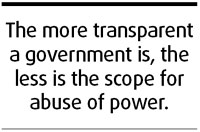The right to know
(China Daily)
Updated: 2008-05-07 07:17
Updated: 2008-05-07 07:17
Five retired workers in central China's Hunan province have taken the lead in using the country's regulations on disclosure of government information that took effect on May 1. They have sought to protect their right to know about the functioning of the government by taking their Rucheng county magistrate to court.
They believe that their local government has violated the regulations by turning down their request to make public an investigative report on the acquisition of their original State-owned enterprise by a private one.

The first-ever case of its kind has initiated a debate between governments at different levels and residents on how much the latter are entitled to know about the governing process and how much a government should inform the people of what it has done or what it intends to do.
No one would question the fact that the regulations are meant to function as a legal guarantee for the residents' right to know about how their governments have served the interests of the general public. No doubt their implementation should be hailed as a progress in the rule of law and in the establishment of a democratic and transparent government.
Yet, it would be too naive to take it for granted that these regulations alone will push governments at all levels to disclose whatever information the citizens are entitled to.
For those government officials who intend to make illegal gains by abusing their power, the more transparent a government is, the less possible it will be for them to abuse their power. So it is quite natural that the implementation of the regulations will meet resistance from them.
Even for those clean officials, the publicity of some information that they used to keep under wraps will exert pressure on their work. It will also be natural for them to show reluctance in disclosing some information that should be made public.
So much needs to be done before the regulations are implemented in letter and spirit.
Probably we need a mechanism to decide whether some kind of information needs to be made public or not when residents and government officials disagree.
We may also need to have amendments to our laws on administrative procedures in order to stipulate penalties for government departments or officials for deliberately withholding information that should be disclosed.
Enacting a law is one thing; to implement it smoothly is another. The latter needs a longer and more difficult process.
(China Daily 05/07/2008 page8)
|
|
|
|